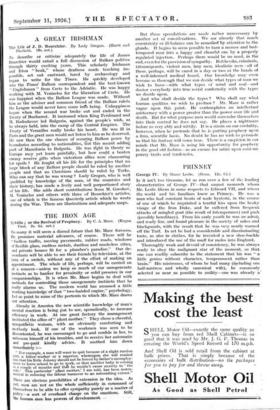THE IRON• AGE
S; billa ; or the Revival-of Prophecy. By C. A. Mace. (Kegan Paul. 2s. 6d. net.) • To many it will seem a dismal future that Mr. Mace foresees. Ile promises material advances, of course. There will be fuellcss traffic, moving pavements, rubber roads, windows af flexible glass, 'listless metals, dustless and smokeless cities, and private houses fit for a plumber's paradise." Our de- scendants will be able to see their friends by teleVision, at the turn of a switch, without any of the effort of making an appointment. The whole of life, perhaps, will be carried on at a removeunless we keep- so much of Our unregenerate instincts as to hanker for proximity or solid presence in our companionships. It is -when Mr. Mace begins to deal with methods for controlling those unregenerate instincts that he really alarms us. The modern world has amassed a little working knOwledge of that "-two-handed-ertgirie," psychology. Let us point to some of the portents to which Mr. Mace draws- out attention. • .- -
Already in America the new scientific knowledge of man's
mental reaction is being put to. use, sporadically, to increase efficiency in work. At one great .factory the management instituted the office of" plant mother." They chose a cheerful, sympathetic woman, with . an obviously comforting and. motherly look. If one of the workmen was seen to be discontented, he was encouraged to go and confide in her, to unbosom himself of his troubles, and to receive her autOmatic snd pre-paid kindly advice. It soothed him down immediately For example, a man will want to quit because of a slight ruction with a fellow-worker or a superior, whereupon she will remind him that his little Johnny should not be forced by father's unemploy- ment to leave school to go to spik, or that anotherbaby is corning is a couple of months and thit he mustn't cause anxiety to the Vie.' This particular plant mother,' I am told, has been instru- mental in reducing the labour turnover to an astonishing extent."
There are obvious possibilities of extension in the idea. As Yet, Men are not on the whole sufficiently in command of themselves to be able to offer sympathy purely as a matter of Wicy--a sort of overhead charge on the emotions. Still,' the human-race has powers-of. development. But these speculations are made rather unnecessary by another set of considerations. We see already that much eccentricity or ill-balance can be remedied by attention to the glands; It begins to seem possible to turn a morose and bad= tempered man into a happy and cheerful one by a properly regulated injection. Perhaps there would be no need, in the end, even for the provision of sympathy. Bolsheviks, criminals, intransigeants, violent men, lazy men, idealistic men—all of these, perhaps, will be cured in a day or two at the hands of a well-informed medical board. Our knowledge may' even become so thorough that we can decide what types of man we wish to have—with what types of mind and soul—and doctor everybody into true social conformity with the types we decide upon.
And• who shall decide the types ? Who shall say . what human qualities we wish to produce ? Mr. Mace is rather vague upon this point. He contemplates an intellectual aristocracy with a power greater than the power over life and death. But for what purpose men would surrender themselves into their control he does not say. He places a nightmare before us very ably and wittily. It is a strain on our credulity, however, when he pretends that he is putting prophecy upon a firm, scientific basis. No doubt he has no wish to persuade us that his fantasy will come true. There is a suspicion in our minds that Mr. Mace is using his opportunity for prophecy in the good old fashion-7---as an excuse for satire upon contem- porary- traits and tendencies.






































 Previous page
Previous page